ATELIER ESCHA & LOGY: ALCHEMISTS OF THE DUSK SKY Review
The Atelier series has been around for quite a while now, starting back in 2005 in the U.S., but going all the way back to 1997 in Japan. These games have always focused on item creation and experimentation over epic battles and warring kingdoms, and the series has enjoyed a nice cult following because of that. The game revolves around alchemy, the MacGyver-like art of creating useful items from a pile of random things you pick up in the world. You create all of your own items and equipment, from healing salves to armor, and from weird pies to weapons. The system itself is flush with options, and each creation can be manipulated in a variety of ways to produce different results.
The system is a bit dense to explain in great detail without putting everybody to sleep, but allow me to present the simplified version. Each item you find has a somewhat random set of abilities contained within it, and over time you unlock more and more recipes to create bigger and better items. Over time Escha and Logy both gain additional skills that can alter the way an item is synthesized, such as imbuing it with a certain element, or making it cheaper to create, or allowing that item to transfer more of its abilities to another item you create down the road. You can also distill items, which allows you to breakdown a rare item you've found to gain the recipe used to create it, but you lose that item in the process.
Atelier Escha and Logy is structured in cycles, 3 month cycles to be exact. This is when you turn in reports that detail your progress in multiple goals, one of which is always the progression of the main storyline (or what there is of one). I found this to be a nice incentive to go out and explore the world, and take on the otherwise mundane tasks of gathering synthesis materials and taking on monsters way below my level. The reason being that the more reports you complete and file with Marion, your boss, the more recipes you unlock, money you earn, skills you gain, etc, etc. There is also monetary value in your synthesis bingeing, as each month you are given a stipend for the items you have created, and the ones you still have in stock. You do have to manage your budget wisely early on, since you only get this stipend once a month, though to be fair you’re never really rolling in dough at any point in this game. You can also enlist the homunculi, a small, rabbit-like race who can duplicate items you already have in stock. You unlock this option by fulfilling item requests for Solle, the bluntness personified gateway to resources and funds for your division. He reminded me of Toby from The Office, but with less personality, which I wasn't aware was possible. This helps you save some time and keeps your inventory full by eliminating having to waste materials on making the same items over and over again, such as healing items. Like I said, there are plenty of systems in play here, and they come together to form an addictive whole.
However, you know when I said that these systems compelled you to explore? Well, that is true, but the actual exploring is in short supply. Additional areas open up in time, but each one is segmented into 4 or 5 smaller areas, and none of them really contain that much of interest. You gather materials from the 5 highlighted areas, and there are normally 2 or 3 monsters to fight, which you can avoid for the most part. One of your party members is most always around, but they don’t have anything of real value to add, so each place, even the other towns, feel rather empty and lifeless. The areas themselves are nice enough, but you never feel truly engrossed in this world due to the blatant emptiness in it. Even your home base, while containing much more in the way of npc’s, is still a bit lifeless, and could have used some additional townspeople populating places like the tavern and town square. It's a shame too, since the music in some of these locations is wonderful, and just as bouncy and laid back as the rest of the game.
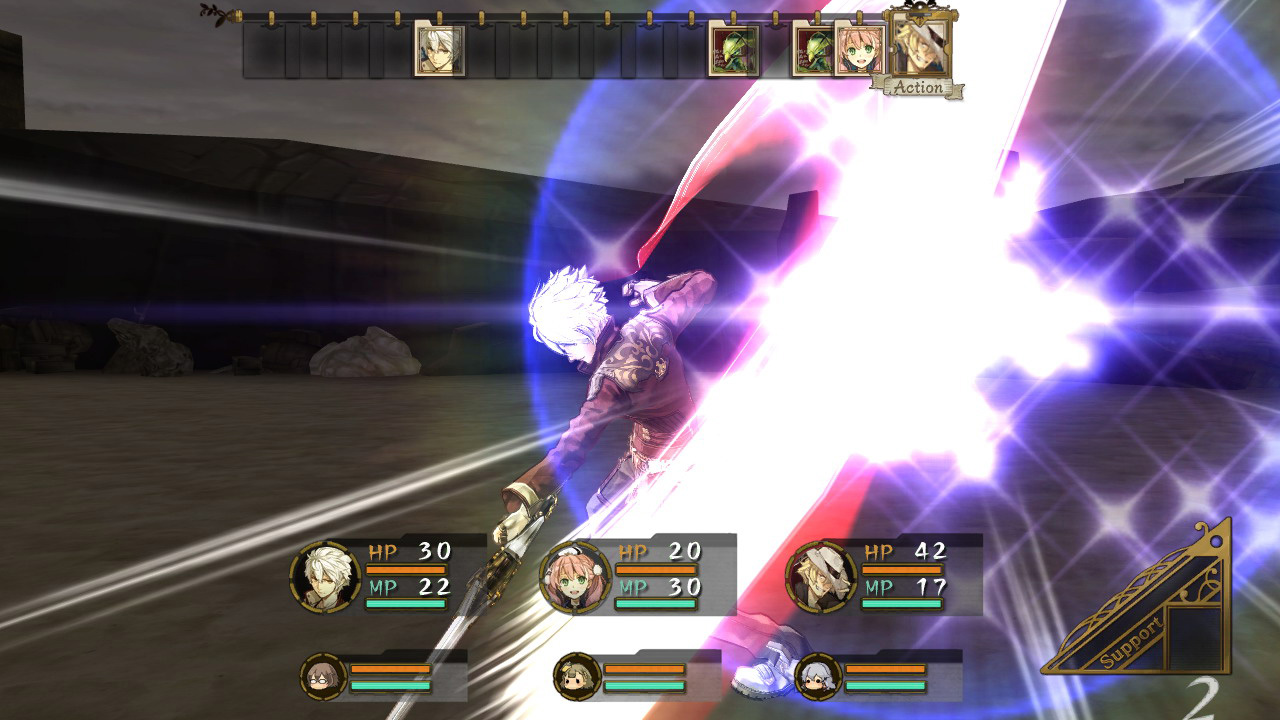
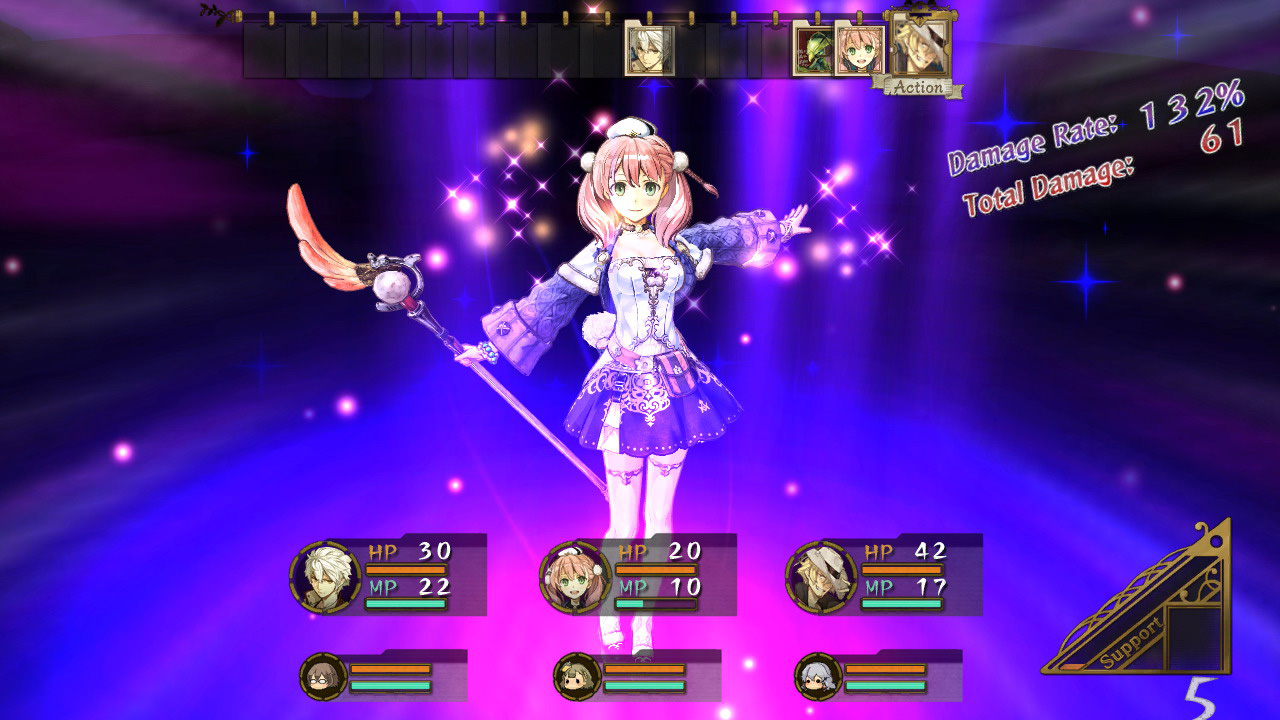
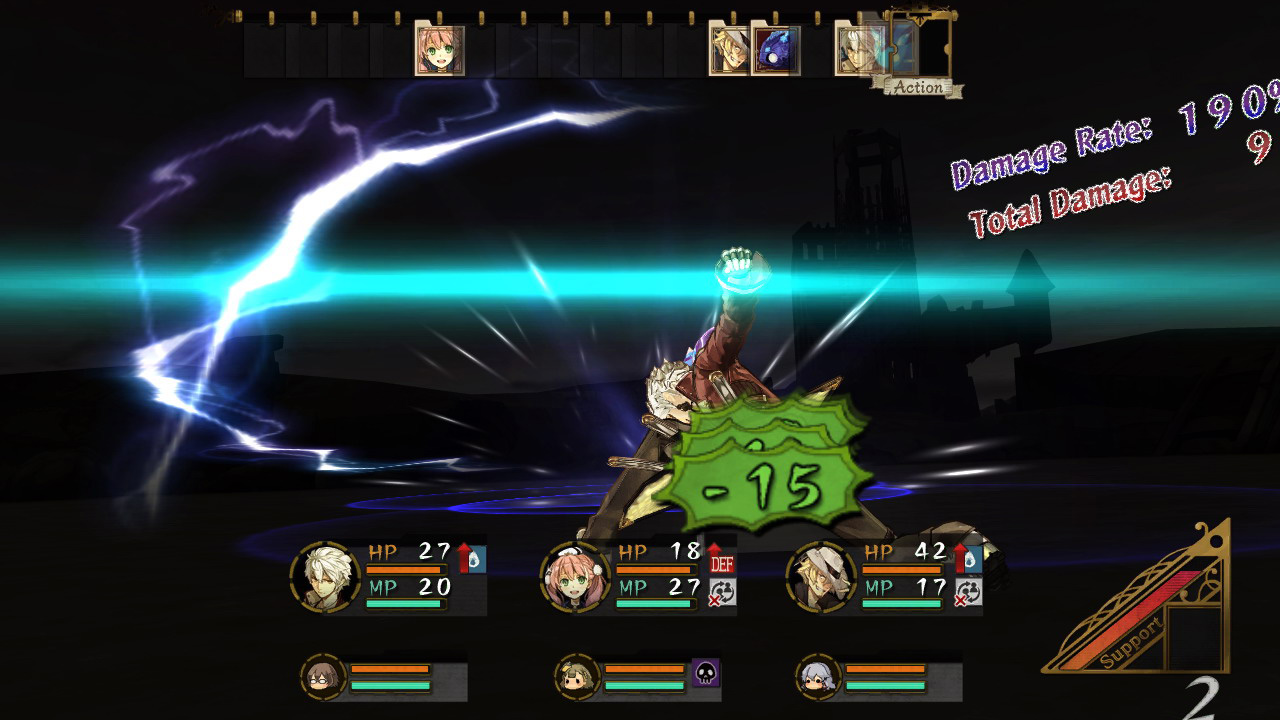
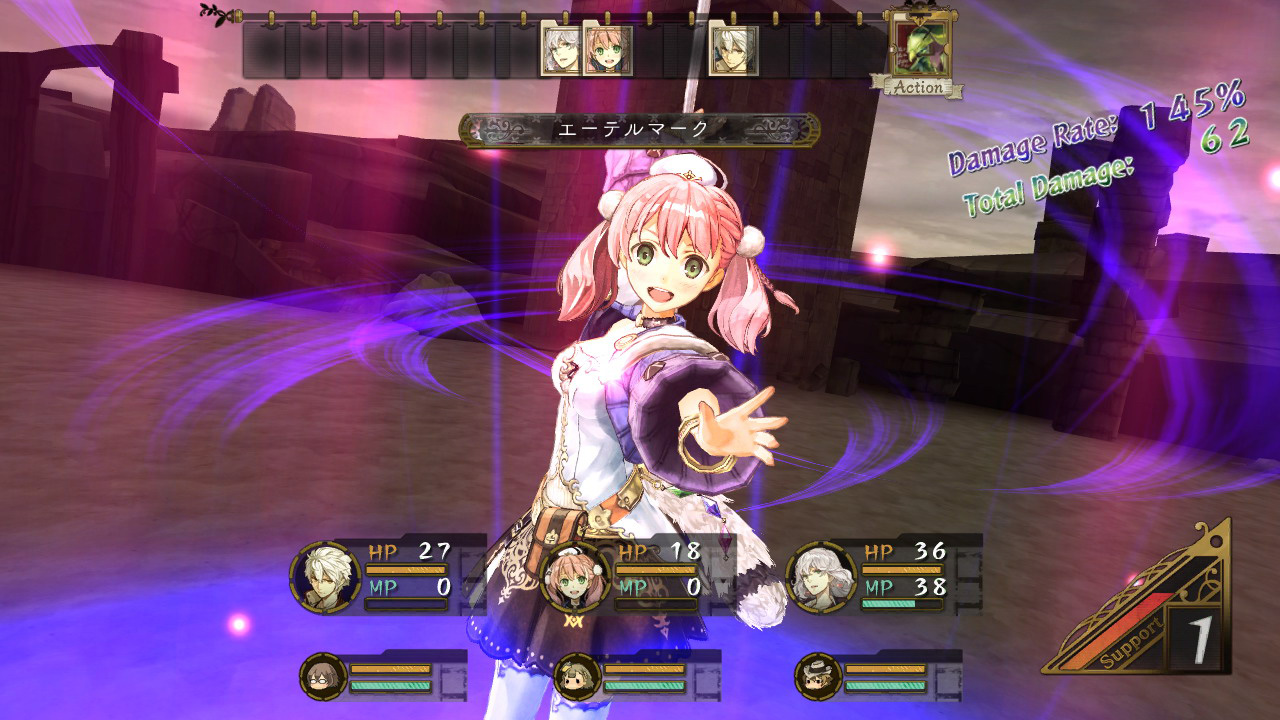
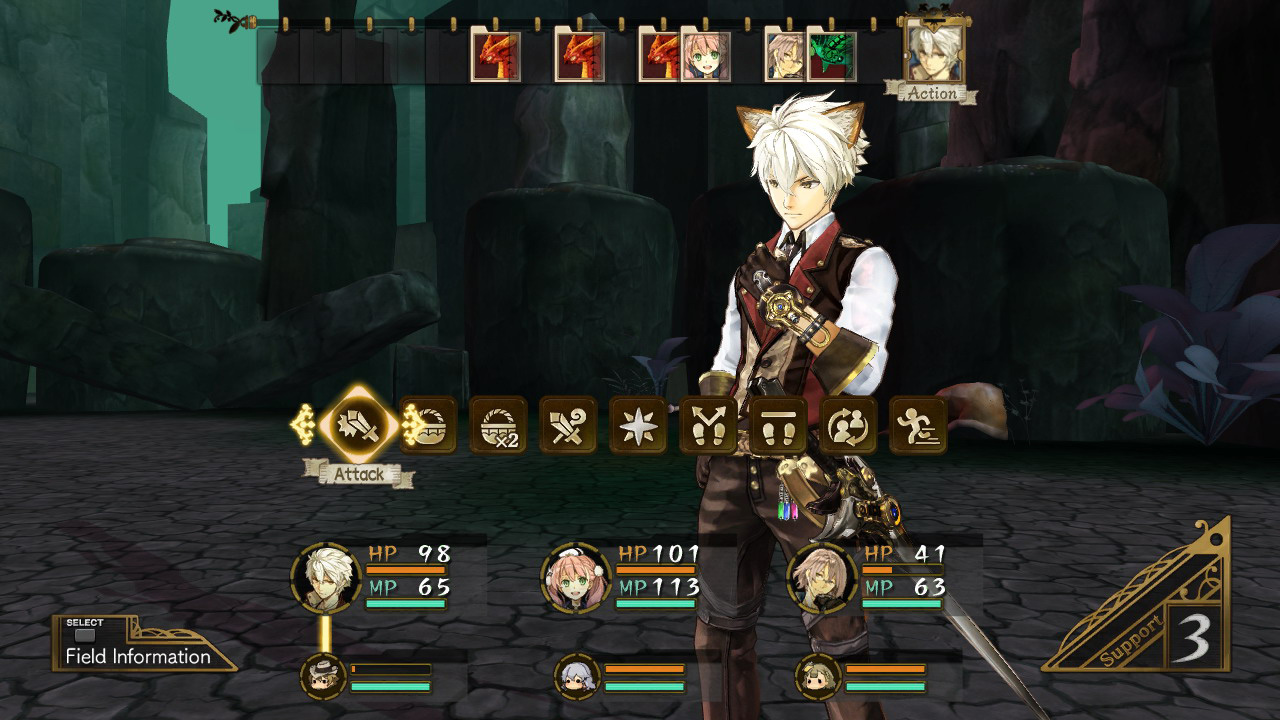
As for combat, the game allows you to take up to 6 members into battle, with 3 on the front line and 3 on the back row that you can sub in at anytime. It also features some additional mechanics, things like support guards, which allow you to sub in a party member to take the damage instead of you. Handy when protecting your healers, but the action also depletes your support bar, which can also be used for support attacks. Depending on how you chain them and in which order, you can have all 6 party members attack during one turn, incredibly useful with more difficult enemies. Your back row slowly gains hp and mp back during a fight, so keeping an eye on everyone’s health bars and mp is recommended, and frequent trips to the imbue station at your atelier will help keep your group competitive with the most damaging weapons. While the game's demeanor would imply the battles are pretty simple and easy, you will get smoked by them if you are not prepared. Plus, any game that allows you to hurl a giant medical needle at someone deserves a little praise.
While I enjoyed all the systems at play here, there was a constant feeling that everything needed just a bit more polish. The animations just take a hair too long when swapping out party members, and even the fighting and blocking animations hesitate a bit before they get going. This chops up the flow and momentum of the fights, not in a game-breaking way, mind you, but enough to be noticeable. A bit smoother execution here would have benefited the combat greatly. I was already 3 steps ahead of the game in determining what I wanted my next move to be, and I felt like I was always being held back by the speed. It did not feel like a framerate issue, rather one of design.
The same can be said for the story progression as a whole. After I got used to the systems, I felt like I was already done with everything I needed and wanted to do, but I still had 60 days to burn before I could turn in a report and move to the next main task. Synthesizing items burns some days here and there, but it won't burn 60, and I just ended up running around to burn the clock until report time. The developers could have implemented some other tasks and side quests to tackle during these times to keep player interest alive and kicking. That said, one of Escha and Logy's weaknesses doubles as a strength. As said before, the areas to explore are split into smaller, bite-sized locales, and while the depth of these areas leaves you a bit wanting, the smaller scope of them means that you can play this game for 15 minutes to half an hour and still feel like you accomplished something. It works for someone like me whose playtime is sporadic at best and doesn’t always have 3 hours of time to dedicate to one task. It's something I appreciated.
This brings us to the ultimate point of the game, and its not as deep as the title might make you believe. The goal is not to bring down an evil dragon, or to restore the earth to its former glory, or anything sizably epic in nature. The main goal is to become the best R&D division around, and to achieve that goal you must be the first to explore the floating ruins in the sky. Not exactly grand in scope, but honestly, it's something I grew to love about Escha and Logy. Most games these days I’m either saving the world, rebuilding it after its complete destruction (normally by our own doing), or something along those fairly popular lines. It was nice to just enjoy a less pressure-filled task, and because the game didn’t take itself too seriously neither did I. While the main story leaves a bit to be desired in grandness, there are many small vignettes throughout that allow you to get to know the cast, and they happen quite often and at random times. Now that scope does expand quite a bit once you reach the unexplored ruins, but for most of the game, it revolves around the day to day life of an alchemist.
All of this led to one of the most relaxing gaming experiences I’ve had in quite a while. The characters don’t leap out at you at first impression, but after several hours you do start to care. The humanizing little ticks revealed over time keep the cast lively. From Reyfer's constant cheapness to Logy’s OCD, to Linca’s not really sure what’s going on with her thing, they all have something that makes them just a bit off and, above all, memorable.
There is something quite endearing about this game. It's not trying to be something it's not, and while it does have its share of flaws, it is an experience I would recommend. Not for everybody, but the game doesn’t really care about that, and neither should you.







